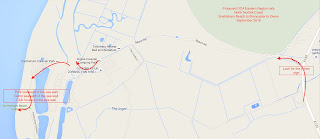Snettisham Beach to Brancaster to Burnham Overy Staithe
(Organised by the magnificent efforts of Chris and Richard)
Adrian, Commodore of the Snettisham Beach Sailing Club has kindly offered DCA members the use of the Club's bar, showers and campsite for the Friday night. There is space for parking cars and trailers.
 |
| Getting to Snettisham Beach |
High Water is early on Saturday morning: the earliest time to launch on the Spring tide is about 1.5 hours before HW.
With a wind anywhere in the North, Brancaster Bar could be breaking and dangerous for dinghies.
With a wind anywhere in the South it should be an easy cruise North, against the last of the flood, and then with the ebb, to Hunstanton. With the square water tower SSE it would be time to turn East, perhaps on a broad reach, toward Brancaster Bar. With the Golf Club to the South turn into the channel. By now the ebb will be running out of Brancaster and the harbour will begin to dry. Tucked in under the bank to the South would be an excellent place to lunch and wait for the tide.
The first is grounding, and sticking, on one of the banks. There would be no alternative but to wait out the ebb (eat and sleep?) and then, when lifted by the new flood, to return to Snettisham Beach. To go on would mean arriving Brancaster in the dark, which is very difficult, especially on a Spring tide.
Grounding might be avoided by regular, frequent use of a three metre sounding cane!
The second is capsizing. The procedure might be first, to send a Mayday; second, to deploy a PLB; third, to attempt a recovery. If the recovery is successful consider whether to be rescued or to cancel the Mayday.
Capsizing might be avoided by reefing early; if you don't like the wind strength, don't go.
 Around mid-afternoon there should be enough water to sail into Brancaster and up to the Staithe. Anyone who lands at the staithe should be careful to run down to the proposed camp site before the ebb becomes too strong.
Around mid-afternoon there should be enough water to sail into Brancaster and up to the Staithe. Anyone who lands at the staithe should be careful to run down to the proposed camp site before the ebb becomes too strong.
Overnight Saturday will be ashore or afloat (actually, aground!).
On Sunday HW is an hour later, but still early by Sunday standards!
To get through Norton Channel will mean starting as soon as your boat floats.
The distance is about 5 miles, so this should be a leisurely cruise arriving at Overy Staithe an hour or so after HW.
The boats can be drawn up on the shingle, and secured, as the tide ebbs.
There is a frequent and regular Coastal Hopper bus service along the North Norfolk Coast, and Snettisham is an hour or two. Better, perhaps, would be for a few people together to take a taxi to collect cars and trailers.
When the trailers have been loaded it might be worth de-briefing over lunch in a local pub?



